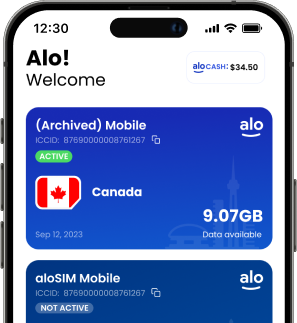Japan is small only in geography, as everything else this nation has to offer is big, big, big! Widely known for its unique ancient traditions, high-tech innovations and beautiful sights, Japan is a booming tourist destination for those seeking rich cultural experiences, world-class Japanese cuisine, or natural wonders.
While visiting, you’ll want to make sure you have reliable data to help you navigate the maze-like streets, provide translation for menus, maps, or museum guides, or to access the schedules for the trains to each of your destinations.
Sure, international roaming is an option, but you should know that it can be prohibitively expensive, so it is worth exploring alternative options for budget-conscious travellers.
Here are a few options to consider and why there’s one option in particular that’s a standout for your travel needs for data roaming in Japan.
Pocket wifi: A portable hotspot
If you need data on your smartphone, tablet, laptop, or other device, Pocket WiFi is a small, portable device with a signal that can connect to each of these.
Advantages
- Reliable: Pocket WiFi does offer consistent internet access in most urban areas of Japan.
- Shareable: If you’re travelling with a group, multiple devices can connect to the same pocket WiFi hotspot.
Disadvantages
- Sizeable: If you’re backpacking or trying to travel light, having to carry the device (as well as a power bank and charging cable) can be cumbersome.
- Costly: Most pocket WiFi devices are available for a daily rental fee, plus potential additional charges for loss or damage.
- No number: Pocket WiFi doesn’t provide the additional feature of a phone number for calls or texts, meaning it’s limited in its functionality.
Public wifi
If you’re lucky enough to find it in public spaces like cafes or at train stations, then you might think that public WiFi is a good option for staying connected in Japan.
Advantages
- Free: It’s always hard to beat free. This is clearly the most budget-friendly option.
- Availability: Big cities like Tokyo, Osaka, and other major cities in Japan have widely available public WiFi.
Disadvantages
- Inconsistent: If you’re relying on WiFi while en route, availability might drop noticeably as you travel through rural areas.
- Unsecure: Public WiFi networks are never secure or safe from hackers or other scams.
- Limited connectivity: It can feel exhausting and inconvenient to constantly seek out hotspots.
aloSIM eSIM
Hassle-free and affordable, an eSIM allows travellers looking for data in Japan to download and activate a data plan without the nuisance of a physical SIM card.
Advantages
- Affordable: aloSIM eSIM plans are often significantly more cost-effective than international roaming fees needed for data in Japan.
- Easy: Just install the aloSIM app to purchase and activate an eSIM online before or during your trip.
- Flexible: With plans of every size, travellers can choose the best one for their needs and even top up if they ever need a little more data on their trip.
- Dual SIM: When using an eSIM alongside your primary SIM card, your home number remains active for calls and texts.
- Free International Phone Number: Unlike the other options like pocket WiFi or public WiFi, each aloSIM eSIM comes with a free international phone number, so you can stay connected with friends, family, or work while in Japan.
Disadvantages
- Compatibility: Unfortunately, not all smartphones have the capability to support eSIM technology. To avoid disappointment, ensure your device is compatible before you move forward with purchasing a plan.
A Japan eSIM is the best option for travellers looking for seamless connectivity, lightweight convenience, and a hassle-free, affordable way to stay connected throughout Japan. Explore Japan the easy way with aloSIM!





